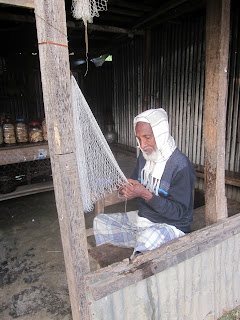It happened fast. Racing over the water, the small boat appeared suddenly, bashing against the minor waves as it crossed them, with the whirring of its motor growing louder as it unexpectedly closed in. The vessel I was on was larger but even if it tried to power away it could hardly have escaped. It was too late for that. What did they want?
I could only take my cue from the other
passengers and the crew, because with everything happening in Korean I was at a
minor disadvantage. The small boat sidled up to ours, its motor cut as an
animated conversation across the gap of water began. The passengers were
fussing; they seemed to be negotiating. It happened near the coast of Hongdo, Red Island ,
in the Yellow Sea .
Winter had come to South Korea
It’s in Korea China
At closer quarters the islands are similarly unwilling to conform to standardised design specifics. A vast range of rock shapes, delicate, unusual and unexpected, document the drop of the island into the sea. Or at least on Hongdo they do. One of the furthest islands from the mainland, Hongdo is famous for the artistry of wind and wave, which is why tourists go there. It’s the reason I was on that boat.
It’s not difficult to reach Hongdo. There are scheduled ferry services to cover the 115 kilometres from Mokpo City
It’s not difficult to organise the two-hour circumnavigation tour of the island by boat, which is the best way to appreciate the gallery of rock formations, nature’s art.
But before that it’s possible to follow the Il-gu-to-I-gu road, the stone and dirt pathway up the nearer hill that rises to about 200 metres. There, the camellia bushes grow large and create, in places, a tunnel. The views, over the island, over the sea and down to the villages, are deep breaths of oxygen, life-bringing. The island takes its name, Red, from the effect of each sunset on its rocks and cliffs; although in spring there is the red bloom of the camellias to be considered.
It was on the second day, near to the end of the circumnavigation tour, that the smaller boat had suddenly appeared. Aboard I could see three men, in thick jackets, two in baseball caps. They had knives.
The passengers were animated. What’s going on, I thought. It was only a matter of moments before the nature of the trouble became apparent.
It was about fish. Fresher fish there could not be. The fishermen in the smaller boat had just caught them and wished to sell them. Meanwhile the fish flapped about in a water-filled bucket.
Although I realise it’s nearly criminal activity in Bangladesh
I watched as fish were sold, the unusual part being in how they were delivered: pre-chopped and salted. With each sale the fishermen took the fish to a wooden board on the deck of their boat, scaled and gutted them on the spot, cutting them into thin strips of boneless meat. Then they were sprinkled with salt, put into a bag and handed across to the larger boat.
The even more unusual part was how they were eaten: directly. There was, I thought, a missing step in the process, in accordance with usual procedure: the cooking part. I watched as Koreans took thin strips of raw fish by hand and pushed them into their mouths.
I was fortunate, arguably, because on our boat was one Ms. Kim from Suwon , near to Seoul
At the same time from somewhere that rice wine, the Korean version called soju, surfaced, to accompany the fish. So I joined in: a nip of soju, then a few strips of salted raw fish gulped down the throat just as a pelican might do. It wasn’t bad, actually, although it might’ve been better not to know what it was. The mood on the boat became festive as everyone, and I was the only foreigner among them, drank and ate.
I don’t wish to imply it was the first time I’d faced raw fish during that preceding first week in South Korea
This result was despite my deliberately having tried to increase the chances of variation, by pointing towards the top of one menu at lunch and towards the bottom of another during dinner. Somehow, I was remarkably consistent in my random choices. Yet I was sure Koreans ate other things.
But of all the raw fish that followed, chased and hunted me down, it was the fish of Hongdo that was the most special, and clearly the freshest.
These days in Dhaka it’s usual to consider the freshness of food, especially when eating from a street side stall. Food freshness is an important consideration anywhere.
It’s just that in countries with a national cuisine that’s something like South Korea’s, a further consideration for the uninitiated might be if the food isn’t actually, on occasion, a little too fresh.
Or, probably, it’s the sort of thing one learns to enjoy.































